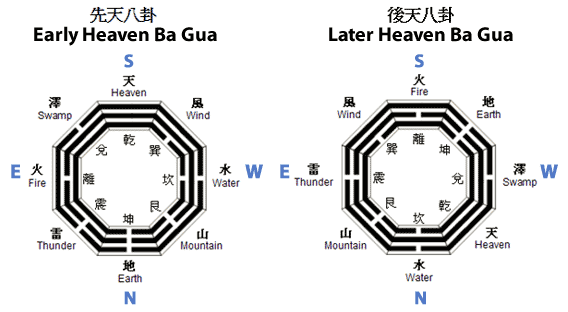Early and Later: Heaven Ba Gua - The Sun Property Plus
4th March 2005
Is Feng Shui Based on Religion or Is It a Science?
Feng shui is definitely not a religion. In fact, anybody can learn and implement feng shui for himself. It is about tapping the qi, a universal cosmic energy, for a person's well being.
Feng shui is also about location and direction. Thus, if something claims to be feng shui but does not have anything to do with location and direction, then it is most probably not feng shui. The art is derived from the ancient Chinese Ba Gua or eight trigrams, which dates back some 6,000 years ago.
In ancient times, there was a sage named Fu Xi who observed the stars in the heavens, the contours of the world, the markings of birds and beasts and all the mysterious workings of nature. From his observation, Fu Xi formulated a common law of existence, which is graphically depicted by the Ba Gua.
The early heaven Ba Gua, which is derived by various combinations of the yin and yang energy, describes the nature of the universe. This can be seen from its eight trigrams (Heaven, Earth, Wind, Thunder, Water, Fire, Mountain and Swamp) that represent the eight directions—north (N), south (S), east (E), west (W), northeast (NE), southwest (SW), southeast (SE) and northwest (NW).
According to Fu Xi's theory of the universe, these are all opposing forces perfectly balanced against each other — a dynamic equilibirum.
Based on ancient formulae, Heaven and Earth support each other, Wind and Thunder wrestle together, Water and Fire do not shoot each other while the qi or energy of the Swamp and Mountain is linked together.
This Early Heaven Ba Gua was later developed and transformed by emperor Chou Wen Wang (or King Wen) of the Chou dynasty into the Later Heaven Ba Gua, which is based on the transformation of the qi of one state to another (see chart).
The yang feng shui principles are derived from the Later Heaven Ba Gua.

One can say that the theory of feng shui is derived from the Early Heaven Ba Gua but its application is based on the Later Heaven Ba Gua, which describes the changes in the state of qi energy. Feng shui uses this knowledge to harness the changing state of qi energy for the betterment of the practitioner.
When Chou, himself a good scholar, was kidnapped and imprisoned by another emperor, he spent time playing around with the Ba Gua and transformed the theoretical aspects into practical applications.
Chou moved Fire to the position of Heaven in the Early Heaven Ba Gua to reflect the hot summer while the position of the Swamp was moved to the W in his Later Heaven Ba Gua. He had the Thunder position in the NE now occupied by the Mountain. The NE is a mountainous region for China with the Himalayas range located there.
Meanwhile, Thunder had been moved to the E, which represents spring, in the Later Heaven Ba Gua.
Chou rationalised that Heaven, which is associated with the elemerit Metal, should not be in the S. With S already occupied by Fire, Metal will get melted or destroyed. Do you know no metals are mined in the south of China?
Chou has thus moved Heaven to the NW in the Later Heaven Ba Gua. Meanwhile, Earth, which is harvest time, was moved to the SW. It was only in the Later Heaven Ba Gua that the five elements of Metal, Wood, Water, Fire and Earth were added to the four cardinal points.
For instance, N, which is considered to be full of Water, represents winter. S, which is represented by Fire, symbolises summer and the sun. The SE, where the Wind is positioned, represents the monsoon.
Feng shui has no bearing with religion. It is similar to the Taoist philosophy, which has its roots in China much earlier than Buddhism, in that everything is cyclical and everything will revert to the tao or nothingness.
The link between feng shui and Taoism is very obvious. The scholars in ancient days were all Taoists and you could say that the Taoists practised feng shui. As the general population became more educated, feng shui spread as a form of knowledge and broke free from Taoism.
Yap Cheng Hai Academy Sdn Bhd
Tel: (03) 2070 8009; Fax: (03) 2072 8009; E-mail: info@ychacademy.com
Disclaimer: Yap Cheng Hai Academy Sdn Bhd does not, and cannot, in any way whatsoever or howsoever represent, warrant or guarantee that the recommendations given in this column mean that the happiness and good fortune of the person(s) who put these
recommendations into practice will naturally or necessarily follow

